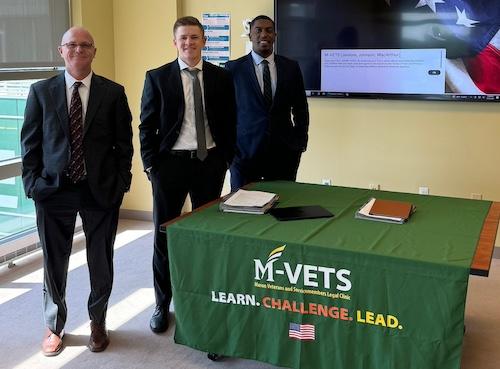M-VETS gave George Mason University third-year law student Danny Jenkins the kind of courtroom experience that no classroom could.

Jenkins, a student advisor in the Scalia Law School, played a crucial role in helping a former servicemember take a substantial step toward securing the benefit he was owed.
The Mason Veterans and Servicemembers Legal Clinic (M-VETS) provides free legal services to veterans and servicemembers, making it a unique program in legal education. Since its founding in 2004, it has become a model for similar clinics at law schools across the nation.
“That’s exactly why I wanted to be part of it,” said Jenkins, a 28-year-old Provo, Utah, native. “I’ve always felt indebted to our servicemembers for their sacrifice, and being able to really make a difference in a veteran’s daily life is extremely satisfying and rewarding.”
M-VETS Director Timothy M. MacArthur emphasized the clinic’s collaboration with George Mason’s Office of Military Services, the Military, Veterans, and Family Initiative, and the Center for Community Mental Health to better support veterans.
M-VETS enables George Mason law students to assist veterans, servicemembers, and their families with a wide range of litigation and non-litigation matters. Over the past two decades, the clinic has helped hundreds of clients from all five branches of the armed services, offering services like appeals for the Department of Veterans Affairs (DVA) Board of Veterans Appeals for disability and educational benefit claims, and the filing of requests for increases in disability ratings. M-VETS services are available regardless of the veteran’s state of residence.
“Supporting our veterans is incredibly important, not only because of their sacrifices, but also because of the unique challenges they face after service,” MacArthur said. “They’ve served our country, and providing legal support is a way for me to show my gratitude.”
Jenkins, who plans to join the Army JAG Corps after graduating and passing the bar, volunteered to take on a case involving a client M-VETS had represented since 2018. The case stemmed from a claim for a Certificate of Eligibility (COE) for a DVA home loan, and finally went before a judge on Aug. 23 after nearly six years of litigation.
Jenkins conducted the hearing, arguing for the COE under MacArthur’s supervision, before the DVA’s Board of Veteran Appeals. The client, a Virginia Army National Guard veteran, had been denied the COE because he hadn’t met the required six years of service. During his initial training, the client had injured his right ankle while on active duty, which led to his discharge. Exceptions are allowed for those discharged from service due to a service-connected disability, but the veteran’s discharge papers didn’t indicate an injury-related separation.
Jenkins argued the motion and presented evidence proving that the discharge papers were inaccurate. While M-VETS awaits the ruling from the Board of Veterans’ Appeals, it is helping the veteran to correct his records with the Board for Correction of Military Records to reflect a medical retirement.
“The most challenging part of this case was preparing for the hearing,” Jenkins said. “I needed to make sure I had information and research for any potential questions or issues that would arise, which required a tremendous amount of time and effort.”
While Jenkins doesn’t have a personal military background, his grandfather and father-in-law are veterans. Reflecting on the case, he described the experience as “incredibly satisfying,” offering the kind of real-world experience and personal satisfaction that no classroom could ever provide.
“I came to law school to help people, and most of your time in law school is spent in classrooms,” Jenkins said. “This unique opportunity allowed me to step outside the classroom and make a real difference in someone’s life.”
Related Stories
- January 27, 2026
- January 20, 2026
- January 8, 2026
- December 12, 2025
- November 11, 2025
